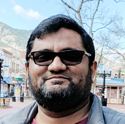
Dr. Zubair Anwar
Head of Analytics, Consumer support Google, Massachusetts Institute of Technology
Keynote abstract
Title: Power of an Analytical Culture
Lack of an analytical culture is often the final hurdle for organizations to fully maximize the potential of their data. Even an organization like Google with its famed data-driven culture cannot avoid this pitfall. We will walk through a few examples that demonstrate how complex analytics and tools are not necessarily better than simple and consumable analytics fortified by a culture where analytics is part of doing business rather than an add-on.
Brief profile
Zubair leads the global analytics team for consumer service operations at Google. His team manages analytics for 40+ products (including Gmail, Search, Maps, Chrome, Play, and Drive) for a range of consumer facing operations: help center, forums, social, and live support. Previously he worked on sales enablement tools and strategic analyses for Google's publishing partners. Before Google he was a consultant at McKinsey and Company advising leading high tech, healthcare, and industrial companies on issues of strategy, technology, operations, and organization. Zubair earned his PhD in Chemical Engineering at MIT.
|
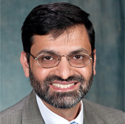
Dr Imran Hayee
Professor, University of Minnesota Duluth
Keynote abstract
Title: Connected Vehicle Technology: What, Why and How?
This talk will focus on the role of dedicated short range communication (DSRC) which is commonly known as connected vehicle technology in future generation intelligent transportation systems. The emphasis will be on what is DSRC and why its a better choice than other competing wireless technologies to enable traffic safety and mobility applications. Also, the state of the art progress in development of this technology in the US and other parts of the world will be reviewed. Various hurdles in its widespread deployment will be discussed as well.
Brief profile
Dr. Imran Hayee is a professor of electrical engineering at the University of Minnesota Duluth. His current research interests are in the areas of communication systems and intelligent transportation systems. He completed his Ph. D. from the University of Southern California, Los Angeles in Dec 1998. After completing his Ph. D., he worked in industry for almost 6 years before joining the electrical engineering department of the University of Minnesota Duluth. Dr. Hayee holds 16 US patents and has published more than 60 research articles in peer reviewed journals and conferences.
|
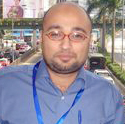
Dr Muhammad Atif Tahir
Professor, FAST University, Karachi Campus
Keynote abstract
Title: Machine Learning Techniques for finding abnormalities in the Gastro-Intestinal Tract
An endoscopy is a procedure in which a doctor uses specialized instruments to view and operate on the internal organs and vessels of the body. This talk aims to discuss recent techniques of machine learning to predict the diseases and abnormalities in the Gastro-Intestinal Tract. It differs from other techniques in the medical domain because it does not use medical imaging like X-rays, CT scan etc but multimedia data from wireless imaging. Recent deep learning and computer vision techniques from the fields of multimedia content analysis will be discussed.
Brief profile
Dr Muhammad Atif Tahir received his PhD from School of Computer Science & Engineering at Queens University, Belfast, UK, MSc in Computer Engineering from King Fahd University, Dhahran, KSA, and BE in Computer Systems Engineering from NED University of Engg, and Tech., Karachi, Pakistan. He is also academic fellow of UK higher education. He is currently working as Professor in School of Computer Science, FAST University, Karachi Campus, Pakistan. Before joining FAST, he was working as Senior Lecturer at Northumbria University, United Kingdom.
Dr Tahir also worked as Research Officer at the Centre for Vision, Speech and Signal Processing (CVSSP), University of Surrey on research projects involving interactive semantic video/audio search with a large thesaurus of machine learned audio-visual concepts and face recognition on uncontrolled environment. He has developed novel machine learning methods for concept detection/visual learning/face recognition. One of my methods has achieved the best performance and ranked top in prestigious international software competitions on visual category recognition (TrecVid 2009/2010, Pascal VOC 2010/2008, ImageCLEF 2010). Recently, his method ranked in top three in Medical and Satellite Imagery tasks in MediaEval 2017. Dr Tahir also worked as Research Fellow in University of the West of England. His main research is in Machine Learning & Combinatorial Optimization Techniques with applications in image / video retrieval, cancer classification, surface inspection, bioinformatics, multi-label classification, and face recognition. He has authored and co-authored more than 60 publications in top quality journals including IEEE Transactions on Pattern Analysis and Machine Intelligence, Pattern Recognition, Journal of Machine Learning Research, IEEE Transactions on Multimedia.
Google Scholar: https://scholar.google.co.uk/citations?user=tBKYSE0AAAAJ
|
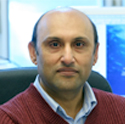
Dr Sibte Raza Abidi
Professor, Dalhousie University, Halifax
Brief profile
Syed Sibte Raza Abidi is Professor of Computer Science, Professor of Medicine and Director of Health Informatics at Dalhousie University, Halifax. He leads the NICHE (kNowledge Intensive Computing for Healthcare Enterprises) research group. Dr. Abidi conducts research in artificial intelligence, semantic web, data analytics and health informatics. His research focuses on investigating innovative knowledge- and data-driven intelligent techniques for context-sensitive decision support, ambient assisted living, knowledge management and information personalization. He has published over 200 peer-reviewed research papers, supervised over 75 graduate students, delivered over 100 invited talks and has secured research grants totalling $20 million from government organization and industry. He is an internationally recognized expert in the field of health informatics; his innovative digital health systems are in operation at various health institutions. He has extensive experience of international collaborative R&D projects that involve the design, development and evaluation of state-of-the-art digital systems. Dr. Abidi is the recipient of the Canadian Health Informatics Leadership Award, International Award for Innovation in Medical Informatics, Research Excellence Award and 5 best paper awards at international conferences. His passion is to develop innovative digital health solutions to provide lifetime healthcare to all.
|
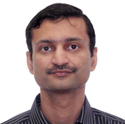
Dr Tahir Khan
Post-Doctoral Fellow, University of Engineering and Technology, Peshawar
Keynote abstract
Title: Artificial immune systems and Applications
Artificial immune systems (AIS) are highly distributed systems based on the principles of the natural immune system. AIS provides robust and powerful information processing approach for solving complex real-world and computational problems in diverse applications including pattern recognition, robotics, structural health-monitoring, network security, multi-agent systems, data mining, optimization, scheduling, fault detection and isolation etc.
In contrast to conventional approaches which devise systematic step-by-step procedures, AIS approach provides efficient treatment of complex engineering problems and the capabilities of bio-inspired AIS systems go far beyond those of conventional technological means. One of the most striking characteristics of AIS systems is their robustness and high tolerance which underlies the principles of distribution, where small pieces by themselves are not "deadly" significant to the whole, but when these pieces are put together as an ensemble of individuals (or agents), very complex behaviors can emerge.
Brief profile
M. Tahir Khan received the Bachelor's degree in mechanical engineering from NWFP University of Engineering & Technology, Peshawar, Pakistan, Master's degree in Mechatronics from University of New South Wales, Sydney, Australia, and Ph.D degree from the University of British Columbia, Vancouver, BC, Canada, in 1997, 1999, and 2010, respectively. He was a Post-Doctoral Fellow with the Industrial Automation Laboratory at the University of British Columbia, Vancouver, BC, Canada for two years until January 2012. Currently, he is professor with the Department of Mechatronics Engineering at the University of Engineering and Technology, Peshawar, Pakistan. He is an associate editor of Control and Intelligent Systems Journal and guest editor for many special issues. His research interests include Robotics, and Intelligent Control Systems.
|
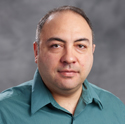
Dr. Ozgur Turetken
Professor & Director, Ted Rogers School of Information Technology Management
Ryerson University
Toronto, Canada
http://www.ryerson.ca/itm/faculty/ozgur-Turetken/
Keynote abstract
Title: Technology in everyday life: Digital Divide 2.0
The theme of this conference this year is very broad. Like "ICT in business", when one thinks about "ICT in everyday life", there are a huge number and variety of topics that come to mind. We can talk about the next smart phone or tablet, the amazing optical capabilities built into them that make everyone of us a photographer of sorts. Or we can discuss how digital music services like Google music and Spotify or video streaming as offered by YouTube and Netflix are affecting our lives. We can talk about smart homes with IP enabled meters and switches increasingly controlled by devices such as Amazon's Echo or Google home. As one IBM executive once told me, the cars of the near future will be commoditized hardware, which sophisticated software turns into powerful machines. The self-driving car is already here.
We can discuss all of this, and such discussion is awfully interesting. But to me, there is one concept that is worth attention amid all of this fast change and excitement. Technologic change has always been there since the early days of the mankind, but what makes our times outstanding is the fast pace with which we need to adapt to it. What that brings are paradigm shifts that used to be observed between generations now being experienced over and over again within one generation. We are talking about digital natives and the rest of us who can still remember when we used to watch 20 inch CRT TVs without a remote control, let alone a touch screen! It is fascinating to observe and having to deal with what these differences does to our discourse between generations in the society. I want to call this digital divide 2.0. In contrast to the digital divide between "haves" and "have nots", this is the divide between people growing up with advanced technologies and those who can remember life without them. But there is more to it. Every time a drastically new technological paradigm emerges in our lives, we experience a mini generation gap. Children who are born today are virtually a different generation than today's 10 year olds. This is a complex phenomenon, and in this talk I would like to make an attempt in covering some of its implications in areas like education, consumerism, and dissemination of information that I have first-hand observations in.
|

Dr. Shu Schiller
Department Chair
Department of Information Systems & Supply Chain Management
Raj Soin College of Business, Wright State University
http://blogs.wright.edu/learn/schiller/
Keynote abstract
Title: Digital Media in Everyday Life
Digital media are now parts of our daily life. They are pervasive, influential, and powerful. Digital media operate in a complex social system and are supported by sophisticated digital technologies. The social aspects of new media, social media, and communication are of equal importance to, if not more than the technical aspects of digital media. This session will provide an overview of digital media such as social media, social networking sites, online news, digital stories, and how they influence our everyday life. We will discuss the social implications of digital media through culture, communities, identity, inclusion, and political associations. More importantly, these discussions should encourage IS scholars to advance digital engagement as an engine for social change.
|
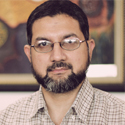
Dr. Adnan Noor Mian
Associate Professor and Chairperson, Department of Computer Science, Information Technology University (ITU), Lahore.
Keynote abstract
Internet of Things: Technologies, Applications and Challenges
Internet of things (IoT) aims to monitor and control different devices without human intervention. The IoT devices are expected to perform multiple operations like sensing, processing, actuating, and communicating with other devices. For each of these tasks multiple technologies exist. Each technology has its own pros and cons depending on the application scenarios. Though IoTs lead to new possibilities for networked devices but face issues such as low-power processing, lightweight communication, lossy links networks, and battery constraints.
In this talk, after exploring different IoT technologies I will talk about how these technologies can be used in exciting new ways for a particular IoT application scenario. Often IoT scenarios require low-power and low-data rate devices connected wirelessly through lossy links. For such cases different IoT architectures have been proposed. Each layer of such an architecture has a corresponding equivalent for a conventional network architecture but also have many differences. These differences result in specific research and technology challenges in building IoT based applications. In the end I will give a brief overview of the work we are doing in the IoT Lab in the Information Technology University, Lahore.
Brief profile
Dr. Adnan holds a PhD in Computer Engineering and a post doc from the Sapienza University of Rome, Rome, Italy. Broadly his research interests include wireless sensor and ad hoc networks, Internet of Things (IoT), mesh networks, V2X communication, distributed algorithms, mobile and distributed systems and cloud computing. He has published more than 25 papers in some of the best venues of his field of research. One of his paper on service discovery protocols is cited 174 times. As a research supervisor he is mentoring a number of MS and PhD students. In addition to research, he is assisting the research community by serving in a number of technical program committees of national and international conferences and reviewer of many international journals and government project funding agencies. He is also the founding chair of the Department of Computer Science, Information Technology University (ITU) and has taken a number of initiates in the department to promote research culture. He has taught variety of courses at graduate and undergraduate level at places like National University of Computer and Emerging Sciences (FAST-NU) Lahore, Sapienza University of Rome and Aitchison College, Lahore before joining ITU.
|
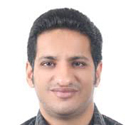
Dr. Waleed Ejaz
Assistant Professor, School of Applied Technology, Humber Institute of Technology, Toronto, Canada.
Keynote abstract
Sensor and Communication Technologies for the Internet of Things
The Internet of Things (IoT) is expected to provide sustainable, efficient, and smart solutions for transportation, governance, environment, quality of life, etc. IoT applications demand diverse and wide range of requirements in terms of latency, reliability, energy efficiency, spectrum efficiency, etc. Therefore, IoT systems must have the ability to deal with the challenging requirements of both users and applications. The talk will provide a comprehensive overview of different sensor and communication technologies for IoT applications. These applications include disaster management, smart homes, smart grid, and charging management for electric vehicles.The focus will be given to reconfigurable IoT systems and energy management for IoT. The most recent results will be analyzed to enhance performance of IoT systems in terms of increase system throughput, coverage, and energy efficiency. Finally, the talk will present future challenges, with special focus on the challenges to support large number of devices, integration of wide range of heterogeneous sensor networks and technologies, as well as integration of context information and user experience in the IoT system.
Brief profile
Waleed Ejaz (S'12, M'14, SM'16) is a Senior Research Fellow at the Department of Electrical and Computer Engineering, Ryerson University and Assistant Professor at the School of Applied Technology, Humber Institute of Technology, Toronto, Canada. Prior to this, he was a Post-doctoral fellow at Queen's University, Kingston, Canada. He received his Ph.D. degree in Information and Communication Engineering from Sejong University, Republic of Korea. He earned his M.Sc. and B.Sc. degrees in Computer Engineering from National University of Sciences & Technology, Islamabad, Pakistan and University of Engineering & Technology, Taxila, Pakistan, respectively. He has experience working with top engineering universities in Pakistan and Saudi Arabia as a Faculty Member. His current research interests include Internet of Things (IoT), energy harvesting, 5G cellular networks, and mobile cloud computing. He is currently serving as an Associate Editor of the IEEE Communications Magazine, IEEE Canadian Journal of Electrical and Computer Engineering, and the IEEE ACCESS. In addition, he is handling several special issues in prestigious journals. He also completed certificate courses on Teaching and Learning in Higher Education from the Chang School at Ryerson University.
|
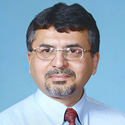
Dr. Mohammad Shahid Shaikh
Interim Dean, School of Science & Engineering, Program Director & Associate Professor, Electrical Engineering
Keynote abstract
A framework for Democratic Knowledge Management using Crowdsourced Human Computation*
Human-intensive problems require human cognition based computational solutions. A new democratic Knowledge Management (KM) framework, called HUMA, is introduced for solving human-intensive problems using crowdsourced Human Computation (HC). This presentation builds upon the existing pervasive Internet culture of information sharing, proactive human interactions, and voluntarily acquired collective intelligence. The design of three Information System artifacts contributed include: KM-HC Workflows, KM-HC tasks, and Crowd4Know crowdsourcing platform. KM-HC workflow is the human-intensive computational workflow that describes a complex solution as a series of KM-HC tasks. KM-HC tasks extends existing HC tasks for knowledge management. Crowd4Know crowdsource KM-HC workflows to communities of citizen human workers. It is shown that HUMA framework facilitates human workers as requestors, executors and beneficiaries of community and civic innovations.
We give insights into the design of future human computation systems. It makes tangible the traditional KM concepts of knowledge space and communities using Crowd4Know platform. Further, it is discussed that human decision-making patterns captured in HUMA justify a new class of machine algorithms. These algorithms are usable, without human involvement, in control environments where safely of human life is paramount or to take human-like decisions in resolving ethical issues.
* Based on PhD research of Mr. Nadeem Kafi.
Brief profile
Dr. Shaikh has been an Associate Professor and Head of Department of Electrical Engineering at FAST–National University, Karachi, Pakistan. He also served as Coordinator for the Graduate Studies Committee at FAST–NU. An HEC-approved Ph.D. supervisor, Dr. Shaikh is currently supervising four doctoral candidates. Prior to joining FAST, he was a post-doctoral fellow at McGill University, Canada
Dr. Shaikh has several years of diversified industry experience. He worked for a number of years as an engineer in the Water and Power Development Authority (WAPDA), a public utility company in Pakistan. Later, he switched to IT and worked as a Programmer Analyst in Pakistan and Canada. In 2004, Dr. Shaikh completed his Ph.D. in Systems and Control from McGill University, Montréal, Canada. He was placed on the Dean's Honor List and won the D. W. Ambridge prize for best Ph.D. thesis in physical sciences and engineering.
|
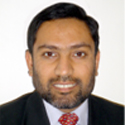
Dr. Amir Qayyum
Professor & Dean, QEC at Capital University of Science and Technology (CUST), Islamabad.
Keynote abstract
Software Defined Networks (SDNs) and their Potential Utilization in Wireless Mesh Networks (WMNs)
This talk will explore the potential of Software Defined Networks, which have received significant attention by the research community and network operators/vendors for the past few years, mainly because of programmable capability that it offers. SDN approach shifts the traditional distributed routing toward a centralized routing mechanism. Taking the control plane off from the routers by making them simple data forwarders, more control to network operators can be provided, which can implement different policies according to their requirement. The discussion will also cover the role and impact of SDN approach, which allows QoS policies to be implemented in a better way in the network, and enables new technologies to be implemented in the network without requiring to change the hardware. Despite having many SDN solutins for wired networks, little attention has been given towards application of SDN techniques in wireless networks and more specifically towards wireless mesh networks (WMN). The talk will conclude by briefly touching upon the potential of SDN techniques to be effectively used in WMNs, by making mesh routers as simple data forwarders which can be controlled/configured through a controller at distance. This can help reduce the significant infrastructure cost associated with WMN. Moreover, this will also make it possible to quickly develop and implement new techniques related to WMN.
Brief profile
Dr Amir Qayyum is a professor and Dean, QEC at Capital University of Science and Technology (CUST), Islamabad. He did his PhD in mobile wireless networks from University of Paris-Sud, France. Since 1997, he is actively involved with Internet Engineering Task Force (IETF) and is also a co-author of an RFC on MANETs. He is also involved with Internet Corporation for Assigned Names and Numbers (ICANN), initially as a fellow and then as a member of ICANN Nominating Committee. Dr Qayyum is the Chair, Board of Directors of Internet Society (ISOC) Islamabad Chapter and is one of the founding members of the chapter. He is actively involved with IEEE activities since 2004, and currently serving as the Chair, IEEE Islamabad Section. He is the founding Director of Center of Research in Networks and Telecom (CoReNeT), and is the Project Director of many national and international funded research and development projects in the domain of wired and wireless networks.
|